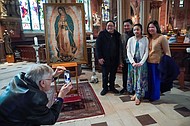March 14, 2023 at 3:23 p.m.
St. Augustine was inspired to write that the woman at the well is indeed a symbol of the Church. His own personal journey, his struggles to find that “one thing” himself, no doubt forged a deep connection in his own heart with the woman’s plight. As a pastor, he had also heard countless stories of so many who, like himself, like that woman, had been looking for love in all the wrong places. For finally that is what we are all looking for, whether we realize it in any given moment, and it is a constant hunger, a constant thirst that drives both our decisions and indecision.
Some might say it is not love we are looking for, but happiness, contentment, fulfillment, a sense of meaning or purpose. Are these really different? For we are made for love, from love and out of love. God is love, St. John tells us, and who abides in love abides in God. To be made in the image and likeness of God is to be made in love, out of love and for love. It is as much the essence of who we are as it is the very essence of God. We cannot be happy, or content, or fulfilled, or “find” a sense of meaning or purpose except in love. The surprise of the woman’s story, however, is that love found her. Love comes to her as a surprise, in the person of love incarnate, Jesus himself.
St. Augustine, as is well known by his own confessions, was searching for love for much of his life. He had looked for it in a life of learning, physical training and sensuality, moving literally at times from flower to flower, much like a bee in search of honey. We do not know the full background story of the woman Jesus encountered that torrid noon. We know it is not likely she would have been there at that hour were she not in some way an outcast, not connected with her community. A lonely, lost soul indeed! The usual drawing times were in the cooler hours of the morning. If, as St. Augustine suggests, we see this encounter as a type or model or symbol of our relationship with God in the Church, we would say that the woman was not a regular churchgoer, or one likely to “come” to church.
The woman was a Samaritan, which means she was a foreigner, of a race alien to the Jewish community of which Jesus is an intimate part. Jews did not associate with Samaritans, let alone use their vessels. Her first surprise of the day was that any man would approach her. Personally, the men in her life had not brought her the love she was looking for — as Jesus well knew — and she was only right to be suspicious that this one would not do her much good either. Realizing that he was a Jew was her second surprise. She may not have been familiar with the verse “salvation comes from the Jews,” but she could hardly have been expecting much good from Jesus, perhaps little more than many may expect from the Church, either by personal frustration or notoriety if all they have known is what they have been told or have read in the papers.
The third surprise came when Jesus asks her for a drink! What could God possibly want from us, we might ask ourselves. Often, is it not true, even we among the baptized may tend to think of “church” as a place that people come to, and of our role as disciples of Christ to get people to come “to church.” Here, we see just the opposite, God incarnate coming to us, coming to the sinner, the outsider, the outcast — and Jesus himself, Love incarnate, asking the sinner for a drink. And that has to be made clear. God approaches us, as Jesus encounters the woman, in our sinful state. If we omit the penitential rite at the start of the Mass, or gloss over or rush through it, we may miss the movement in the rest of the Mass, that this is about God coming to us in our need, in our sinful state. It is not all about us, what we do or who we are, but what God is doing for us. We are being invited by God.
The next surprise awaiting the woman, once Jesus firmly but gently outs her story, is that he presents himself as one in need of what she has to offer. After several failed relationships, having labored and lost so often in the game of love, and being abandoned by her community, her self-esteem, her sense of human worth, was likely as dry as an empty well. The water that Jesus seeks is the balm of her love. He is more than implying that she has not lost her capacity for love and that he wants her love. The water he offers her is God’s grace, the unconditional love that she has never experienced and that alone can liberate her from all her false and inadequate loves in the past. Though “experienced,” she has much yet to learn about love.
To complete St. Augustine’s reflection, the woman is a symbol of the Church from which the waters of grace will flow when the Church remains faithful to Jesus who fills her with his life and love-giving grace, poured out from his wounded side on the Cross. Not to be missed is the exhortation to each of us as missionary disciples, Christ-centered and Christ-like, to go out into this often hostile and alien world and to bring the good news of hope to every woman-at-the-well, and to the Church community itself, wherever it may be, not only in an incensed-perfumed temple but in the often-putrid margins of the world.
Much for us to contemplate here. We know that, once empowered by the surprise of this new-found affirmation, having encountered the personal love of God, the woman’s barriers of fear break down. Like a born again or newly aware Christian, she hurries back to the villagers from whom she had been alienated and becomes a prophetic witness herself, testifying that she may have encountered the one thing she had been looking for her whole life. As John’s narrative continues, she draws others to Christ and, on encountering him, they themselves come to believe, no longer on her word, but from their own personal experience.
This is the story of Christians who have come to know Jesus in their lives as the love they are looking for and the love that becomes the center of their lives and all their relationships. It is this personal encounter with the Lord, the surprise of discovering that it is God who seeks us out and loves us first, that unleashes the fire of the Holy Spirit, the love between and among the Father and the Son, Christifying us and the entire Church, indeed the world. One might say, it is in living this love, that we are Christians. If we wonder or worry at times where all the people have gone we might ask ourselves whether others have lost interest in us because they do not see us being about — living — what we are teaching and preaching. But perhaps we may yet surprise them with love, the love that has surprised us and which we are on fire to share.
@AlbBishopEd
250 X 250 AD
250 X 250 AD
Events
250 X 250 AD






Comments:
You must login to comment.